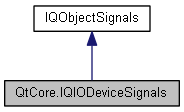|
Qyoto
4.0.5
Qyoto is a C# language binding for Qt
|
|
Qyoto
4.0.5
Qyoto is a C# language binding for Qt
|


Public Member Functions | |
| void | ReadyRead () |
| | |
| void | BytesWritten (long bytes) |
| | |
| void | AboutToClose () |
| | |
| void | ReadChannelFinished () |
| | |
 Public Member Functions inherited from QtCore.IQObjectSignals Public Member Functions inherited from QtCore.IQObjectSignals | |
| void | Destroyed (QObject arg1) |
| void | Destroyed () |
| | |
| void QtCore.IQIODeviceSignals.AboutToClose | ( | ) |
This signal is emitted when the device is about to close. Connect this signal if you have operations that need to be performed before the device closes (e.g., if you have data in a separate buffer that needs to be written to the device).
| void QtCore.IQIODeviceSignals.BytesWritten | ( | long | bytes | ) |
This signal is emitted every time a payload of data has been written to the device. The bytes argument is set to the number of bytes that were written in this payload.
bytesWritten() is not emitted recursively; if you reenter the event loop or call waitForBytesWritten() inside a slot connected to the bytesWritten() signal, the signal will not be reemitted (although waitForBytesWritten() may still return true).
See also readyRead().
| void QtCore.IQIODeviceSignals.ReadChannelFinished | ( | ) |
This signal is emitted when the input (reading) stream is closed in this device. It is emitted as soon as the closing is detected, which means that there might still be data available for reading with read().
This function was introduced in Qt 4.4.
See also atEnd() and read().
| void QtCore.IQIODeviceSignals.ReadyRead | ( | ) |
This signal is emitted once every time new data is available for reading from the device. It will only be emitted again once new data is available, such as when a new payload of network data has arrived on your network socket, or when a new block of data has been appended to your device.
readyRead() is not emitted recursively; if you reenter the event loop or call waitForReadyRead() inside a slot connected to the readyRead() signal, the signal will not be reemitted (although waitForReadyRead() may still return true).
Note for developers implementing classes derived from QIODevice: you should always emit readyRead() when new data has arrived (do not emit it only because there's data still to be read in your buffers). Do not emit readyRead() in other conditions.
See also bytesWritten().